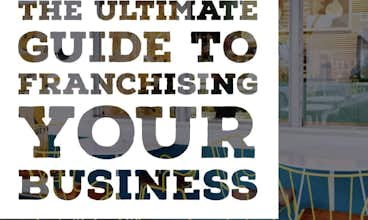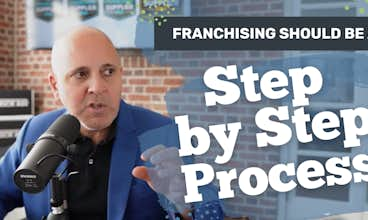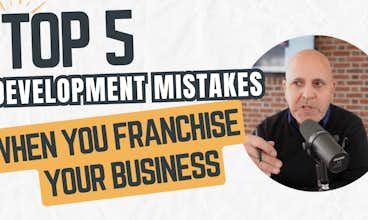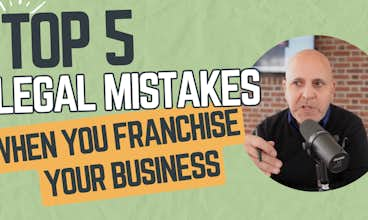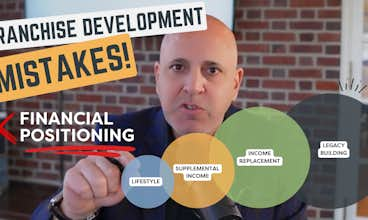Here's how to know if you're being misled by cold-calling franchise developers
Key Takeaways:
- Disreputable franchise developers sometimes prey on successful small business owners who are unfamiliar with the franchise industry.
- Although franchising can be an excellent way to scale and grow your brand, it’s important to make sure your business is positioned for success first.
- By knowing which aspects of your business to assess before franchising, you can ensure that your new franchise system is on the right track from the start.
When you’re a successful entrepreneur with a thriving business and years of experience under your belt, franchising can often seem like the best next step for your business.
As a proven model that’s designed to scale, franchising can be an excellent way to grow your brand and create a lasting legacy. Still, franchising isn’t right for everyone – and even if your profits are strong, it might not be the right time to franchise your business. Unfortunately, that fact often isn’t enough to stop unscrupulous franchise developers from cold-calling small business owners about franchising their businesses while making promises that can sound too good to be true (and sometimes are).
So how can entrepreneurs know if their business is ready to franchise, or if they’re being led into making a bad business decision that could topple their brand? In this article, we’ll discuss the key points every business owner should be wary of when a franchise developer calls – and share tips to help you know if you’re being misled.
What should you do if a franchise developer calls about franchising your business?
If a franchise developer or consultant contacts you about franchising your business, it’s best to exercise caution and know the right questions to ask before proceeding. Even if your business is thriving, there are still plenty of reasons why now might not be the right time to franchise.
Although franchise developers often make grandiose claims about their ability to franchise businesses quickly and easily for relatively low fees, those services aren’t always what they’re cracked up to be – in some cases, they can even turn out to be a franchising nightmare.
In reality, the process of developing a successful franchise brand requires time, commitment and resources. Before franchising, it’s important to do due diligence and ensure that your business is positioned for franchising success – and that you’re prepared to trade in your role as a business owner for a new one as a franchisor.
How do Decide if Your Business Is Ready to Franchise
To determine whether now is the right time to franchise your business
– or if it might be smarter to wait – it’s important to conduct an initial business analysis before choosing to franchise your business. When evaluating your data, remember to focus on the specific aspects of your business that would impact your ability to sell franchises and support franchisees in the future.
1. Analyze Your Finances
Prospective franchise buyers want to make sure they’re getting a solid return on their investment before purchasing a franchise business. Because of that, it’s critical to ensure that your business has a strong financial track record before franchising.
To assess whether your business’ finances are positioned competitively enough for franchising, look at its financial data in the following areas and consider how those numbers might impact a future franchisee’s ROI and economic success:
- Gross sales. What is the sum of your business sales? On average, how much revenue is your business bringing in each month?
- Unit economics. How strong are your profits at each of your business’s locations? Would your unit economics convince a candidate to buy a franchise business from you?
- Operating costs. How much does operating your business cost overall? How much would it cost to start a business like yours today? Remember to consider expenses like rent, utilities and even franchisee royalties.
- Labor costs. How much does your business pay staff and employees?
- Profitability. After business expenses are accounted for, how profitable is your business? How do those profits compare to competitors in your industry?
Keep in mind that even if your business is profitable, it still might not be ready to franchise. Your numbers should stand out against competitors and clearly indicate that your business is well-positioned in its industry.
If your numbers aren’t strong enough yet, that’s okay! Instead of franchising your business right now, consider spending the next couple years preparing to franchise your business so that it’s positioned for success at the right time in the future.
2. Evaluate Your Business' Scalability
Since franchising is a model that’s intended to scale, franchisees should be able to duplicate your business model in locations across the country, and even the globe. Before franchising your business, assess its scalability by looking at key factors that might impact franchisees’ ability to duplicate your business.
Factors that can determine a business’s scalability include, but aren’t limited to, the following:
- Business model. Can your business model be replicated by franchisees across multiple locations while achieving a similar level of profitability?
- Protectability. Are your logos and trademarks registered with the U.S. Patent and Trademark Office? Do you actively maintain and protect them?
- Systems and processes. Have you established consistent standards and policies, created an operations manual or developed an accounting system? Do you have specific policies in place for daily operations? Can those systems and processes be replicated easily across multiple locations?
- Products and services. Have you developed steps of service, recipes or products that can be reproduced consistently across many locations?
- Training. Do you have a formal training process for new hires at various levels within your company? Can that training model be reproduced across many locations?
If your business falls short in any of the areas above, it might be a good idea to focus on improving those pain points before franchising your business.
3. Assess Your Franchise Opportunity Profile
The franchise industry is highly competitive and requires good business acumen and strong sales strategies. Because growing your franchise system will depend on your ability to sell franchises, it’s important to get clear about what your brand has to offer prospective franchisees.
Before franchising your business, clarify its opportunity profile by identifying the unique economic benefits and other advantages it could offer future franchisees:
- Vision, values and goals. As a business owner and prospective franchisor, what is your vision for your brand? What are your brand’s values? What are your personal and business goals as a future franchisor?
- Franchisee support. Franchise success often requires franchisors to provide large amounts of support to franchisees. What support will you offer franchisees when opening and operating their business?
- Economic goals. What’s your ROI? Would your business offer franchisees any financial or lifestyle advantages, such as remote work or flexible scheduling? Will franchisees be able to replace their current income, or will their business provide part-time supplemental income? Is your business virtual or mobile, or will it require a brick-and-mortar location to operate? Does it have legacy-building potential?
If you’re unable to answer any of these questions, now might not be the right time to franchise your business. Instead, focus on building out your GoodFit Franchise Opportunity Profile before returning to the idea of franchising in the future.
4. Check Your Mindset
No matter how successful an entrepreneur you are, becoming a franchisor requires a very different mindset from that of running a business. As a franchisor, you will not only be focused on the success and profitability of your business but also on its growth and the success of each of your franchisees.
To ensure that you’re ready to become a successful franchise founder, consider the following aspects of your current mindset:
- Growth-oriented. Are you prepared to adopt a growth-oriented mindset that’s centered around selling franchises and spending at least the next five years building your franchise system?
- Focused on support. As a founder, the support you provide to your first several franchisees will be critical to the success of your overall franchise system. Are you ready to coach your future franchisees and invest in their success?
- Continuous improvement. Successful franchisors often have one thing in common: they’re committed to improvement. Are you prepared to attend conferences and workshops, learn about the business of franchising, build professional relationships with industry professionals and focus on self-improvement?
Although franchising might be the next step in your plan as a business owner, it’s important to wait until the time is right. By taking time to improve the areas of your business that need to be strengthened before franchising your business, you can ensure that your brand is competitively positioned in the future – and that you’re ready to hit the ground running as a new franchisor when the time comes.
